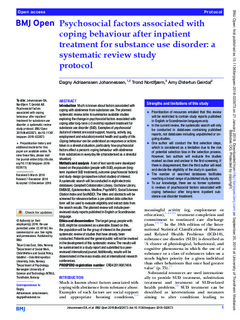| dc.contributor.author | Johannessen, Dagny Adriaenssen | |
| dc.contributor.author | Nordfjærn, Trond | |
| dc.contributor.author | Geirdal, Amy Østertun | |
| dc.date.accessioned | 2019-09-24T11:06:05Z | |
| dc.date.available | 2019-09-24T11:06:05Z | |
| dc.date.created | 2018-12-13T18:56:33Z | |
| dc.date.issued | 2019 | |
| dc.identifier.citation | BMJ Open. 2019, 9:e022673 1-5. | nb_NO |
| dc.identifier.issn | 2044-6055 | |
| dc.identifier.uri | http://hdl.handle.net/11250/2618464 | |
| dc.description.abstract | Introduction Much is known about factors associated with coping with abstinence from substance use. The planned systematic review aims to summarise available studies exploring the change in psychosocial factors associated with coping after long-term (≥3 months) inpatient treatment for substance use disorder (SUD). Examples of psychosocial factors of interest are social support, housing, activity (eg, employment and education) mental health and quality of life. Coping behaviour can be understood as responses or actions taken in a stressful situation, particularly how psychosocial factors affect a person’s coping behaviour with abstinence from substances in everyday life (characterised as a stressful situation).
Methods and analysis A set of text words were developed based on the population (people with SUD), exposure (long-term inpatient SUD treatment), outcome (psychosocial factors) and study design (prospective cohort studies) of interest. A systematic search will be conducted in eight electronic databases: Campbell Collaboration Library, Cochrane Library, EMBASE, Epistemonikos, Medline, PsychINFO, Social Sciences Citation Index and SocINDEX. The titles and abstracts will be screened for relevance before a pre-piloted data collection form will be used to evaluate eligibility and extract data from the search results. The planned review will include peer-reviewed study reports published in English or Scandinavian language.
Ethics and dissemination The target group, people with SUD, might be considered as vulnerable. Based on this, the population will be the group of interest in the planned systematic review of studies that have already been conducted. Patients and the general public will not be involved in the development of this systematic review. The results will be summarised in a study report and submitted to a peer-reviewed | nb_NO |
| dc.language.iso | eng | nb_NO |
| dc.publisher | BMJ Journals | nb_NO |
| dc.rights | Navngivelse-Ikkekommersiell 4.0 Internasjonal | * |
| dc.rights.uri | http://creativecommons.org/licenses/by-nc/4.0/deed.no | * |
| dc.title | Psychosocial factors associated with coping behaviour after inpatient treatment for substance use disorder (SUD): A systematic review study protocol | nb_NO |
| dc.type | Journal article | nb_NO |
| dc.type | Peer reviewed | nb_NO |
| dc.description.version | publishedVersion | nb_NO |
| dc.subject.nsi | VDP::Samfunnsvitenskap: 200 | nb_NO |
| dc.subject.nsi | VDP::Social sciences: 200 | nb_NO |
| dc.source.pagenumber | 1-5 | nb_NO |
| dc.source.volume | 9:e022673 | nb_NO |
| dc.source.journal | BMJ Open | nb_NO |
| dc.identifier.doi | 10.1136/bmjopen-2018-022673 | |
| dc.identifier.cristin | 1643015 | |
| dc.description.localcode | This is an open access article distributed in accordance with the Creative Commons Attribution Non Commercial (CC BY-NC 4.0) license, which permits others to distribute, remix, adapt, build upon this work non-commercially, and license their derivative works on different terms, provided the original work is properly cited, appropriate credit is given, any changes made indicated, and the use is non-commercial. See: http://creativecommons.org/licenses/by-nc/4.0/. | nb_NO |
| cristin.unitcode | 194,67,40,0 | |
| cristin.unitname | Institutt for psykologi | |
| cristin.ispublished | true | |
| cristin.fulltext | original | |
| cristin.qualitycode | 1 | |

